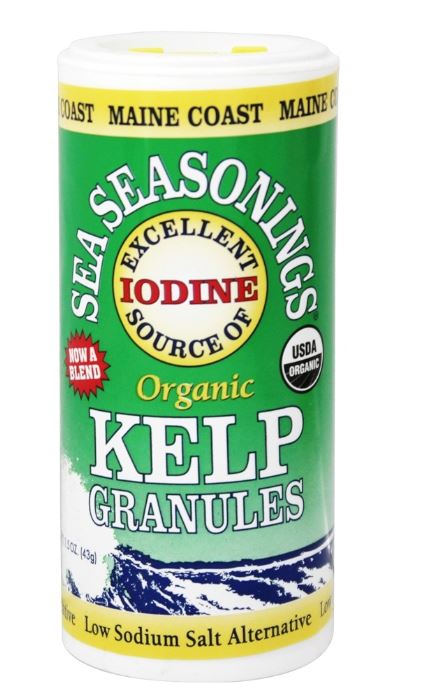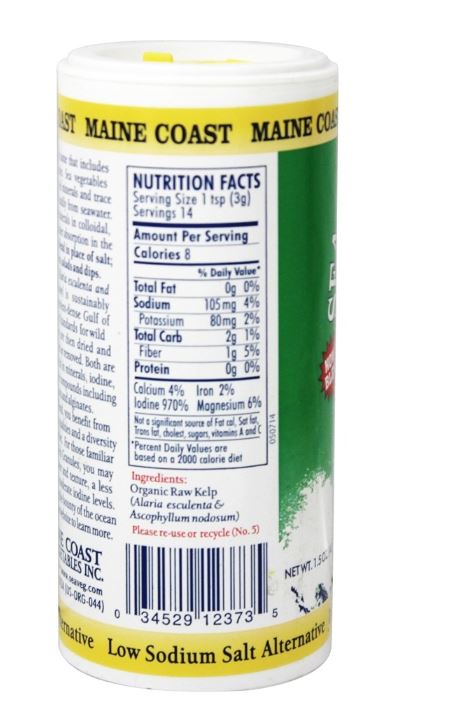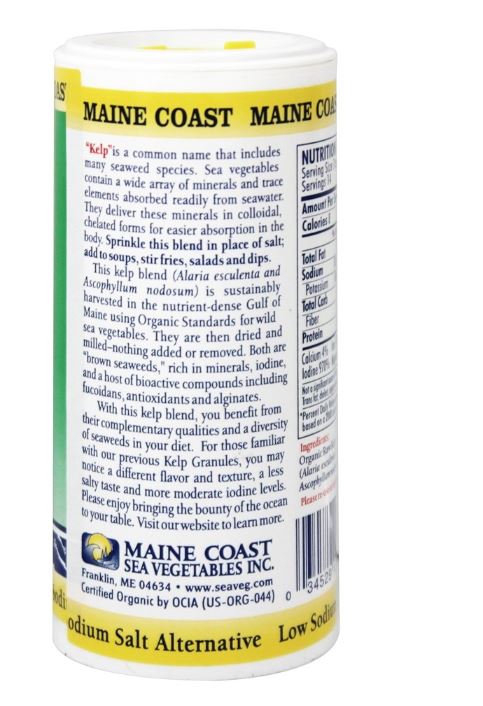Sea Seasonings Organic Kelp Granules - 1.5 oz. Maine Coast Sea Vegetables
Leave a review Ask a question #191076Overview
Description
Maine Coast Sea Vegetables - Sea Seasonings Organic Kelp Granules - 1.5 oz. (43g)
Maine Coast Sea Vegetables Sea Seasonings Organic Kelp Granules as a sprinkle-on Sea Seasonings 1.5 oz shaker, are a convenient way to get your sea veggies. Kelp granules are "salty" yet low sodium, thanks to the rich complement of potassium, magnesium, and other mineral salts. Kelp granules are an especially rich source of potassium, iron, iodine, Vitamin B-6, Riboflavin, and dietary fiber. Kelp also contains a natural substance, glutamic acid, that enhances flavor and tenderizes. Phytochemicals in kelp have been shown to absorb and eliminate radioactive elements and heavy metal contaminants from our bodies. Sprinkle on soups, salads, tofu, pasta, stir-fries, dressings, dips, sauces, breads, tabouli. Get the nutritional benefits of sea veggies, and skip the table salt.
The kelp granules are sustainably harvested, OCIA Certified Organic and a Raw Food. They also voluntarily test for heavy metals, herbicides, pesticides, PCB's, fuel oil, and microbiological contaminants
Wild Harvested Seaweeds from Downeast Maine
Maine Coast Sea Vegetables is located at the very head of Frenchman's Bay. Their certified organic sea veggies are hand harvested from the rocky, sparsely populated "Downeast" coastal area between Bar Harbor and Eastport. The Harvest begins in early April, with snow pack often still on the ground and the shallow coastal inlets still frozen. The low tides of October bring us their last dulse - if they're lucky! All plants are wild and most are certified organic.
Organic Certification means higher quality
You may wonder why they went to the trouble and expense to become certified organic by Organic Crop Improvement Association (OCIA), particularly as they already test their dried seaweeds for the absence of heavy metals, herbicides, pesticides, and microbiological contaminants. It's true that compared to land plants, they have little control over the growing conditions of their wild marine plants. But they do have choices about how, when, where, and how much they harvest, as well as how the seaweed are transported, dried, stored and packaged.
The Organic Standards developed by OCIA address all these areas where unacceptable practices may lead to resource depletion, product contamination, or inferior quality. These standards give clear and uniform direction to all of us (more than 40 now) responsible for harvesting and handling these precious plants. They feel this results in a higher quality as well as a cleaner product for you. Definitely worth the trouble!
Harvesting for a superior product
Bringing sea veggies from the sea to your plate requires many hands. Perhaps none are more important than the harvesters who select the wild plants from the beds where they grow in remote Downeast bays between Bar Harbor and Eastport. The kelp harvesters are the first to get their boats in the water and don their wetsuits or hipboots in early April. When it isn't clear enough to sun dry these prime plants, indoor drying with wood heat or forced hot air are used.
Since 1993 all this harvesting, hauling and storing had been accomplished following the world's first organic certification standards for sea vegetables. This means that each harvester must monitor their beds for sustainability. They must keep their freshly picked plants clear of possible contaminants throughout the harvest transport, drying and packing process. They are randomly inspected to insure compliance. They also test plants for contaminants that are water born, such as heavy metals, PCBs, herbicides, pesticides, E. coli, yeasts and molds.
Maine Coast Sea Vegetables began in 1971
Their company was born in 1971 over a pot of seaweed miso soup in the kitchen of Linnette and Shep Erhart overlooking Hog Bay in Franklin. They had just harvested and cooked their first alaria fronds and found the soup delicious! News of the discovery spread to friends; they told their friends...
From two people producing 200 pounds in 1971, there are now about 40 of us handling around 100,000 pounds of sea vegetables annually. Another 15 year-round crew sort, pack, and market their sea veggies at their plant in Franklin, Maine.
They offer seven organically certified varieties: alaria, dulse, kelp, laver, sea lettuce, rockweed and bladderwrack. They are hand harvested directly from their beds at low tides, dried at low temperatures by sun, wood or forced hot air, and then packaged.
Milestones in their business
- 1985: They test many of their plants for 25 major nutritional factors. (See Nutritional Chart for more information)
- 1986: Their consumer package now offers detailed nutritional analysis, usage guidelines and recipes.
- 1988: They are the first to initiate annual testing of plants for possible contaminants when ocean pollution became a concern.
- 1992: Maine Coast Sea Vegetables is the first processor world-wide to receive organic certification for its harvesting and handling procedures.
- 1992: They move to a renovated 9,500 square foot facility just a few miles from their original home at the head of Frenchman's Bay.
- 2004: They are one of three Socially Responsible Business Award winners. The 10th Annual awards were presented in conjunction with Natural Products Expo East in Washington, DC. See their Press Release 2004 for more information.
- Innovations in Sea Veggie products
- Sea Seasonings: These convenient shakers were their first venture into ready-to-use products featuring ground sea vegetables offered plain or blended with spices and herbs.
- Sea Chips: America's first corn tortilla chips seasoned with sea vegetables - no salt added!
- Kelp Krunch: These lightly sweetened snack bars are their first foray into sea vegetables as fun food. Kids love them - which is a good sign!
Mission Statement
Their mission is twofold: to provide high quality North American sea vegetables as user-friendly foods, supported by reliable information; and to build respectful, long-term relationships with their customers, suppliers, employees and the environment.
Principles & Practices
To the best of their individual and collective abilities, they pursue their mission with honesty, accountability, patience and care. They understand that these gifts from the sea come with the responsibility to maintain sustainable practices in harvesting, processing and merchandising - leaving more than they harvest, producing more than they consume, and giving back more than they take.
Intentions
With their enthusiasm, they encourage the rediscovery of this ancient food source from the sea. With their personal and traditional knowledge, they share what they have learned from their native sea vegetables and from people worldwide who have used them for centuries. With their curiosity, they learn from their customers what they already know or need to know. And with their ingenuity and respect, they intend to thrive into the 21st century.
Suggested Use
Use to season food.
Ingredients
| Maine Coast Sea Vegetables - Sea Seasonings Organic | |||||||||||||||||||||||||||||||||||||||||||||||||||||||||||||||||||||||||||||||||||||||||||||
| Kelp Granules - 1.5 oz. (43g) | |||||||||||||||||||||||||||||||||||||||||||||||||||||||||||||||||||||||||||||||||||||||||||||
|
|||||||||||||||||||||||||||||||||||||||||||||||||||||||||||||||||||||||||||||||||||||||||||||
| Other Ingredients: Organic Raw Kelp | |||||||||||||||||||||||||||||||||||||||||||||||||||||||||||||||||||||||||||||||||||||||||||||
Questions & Answers
2 Reviews
Needless to say, after a week or so I quit using. They need to be smoother and actually have the ability to dissolve.




















It works!
Recommended by a friend
trying a new brand of zinc lozenge
Good for colds etc..